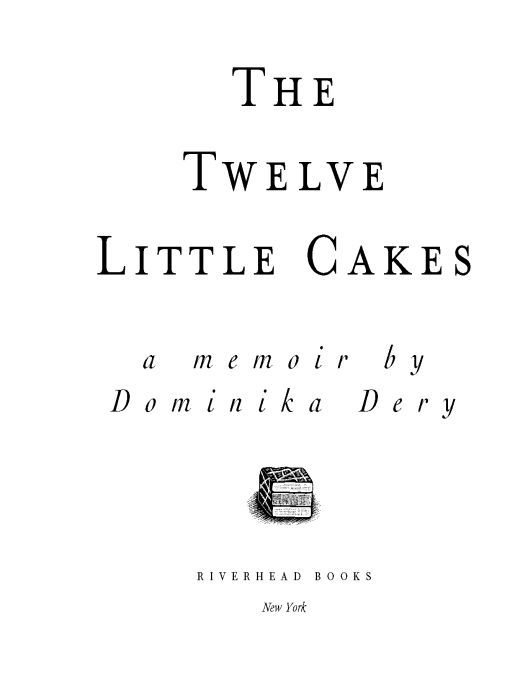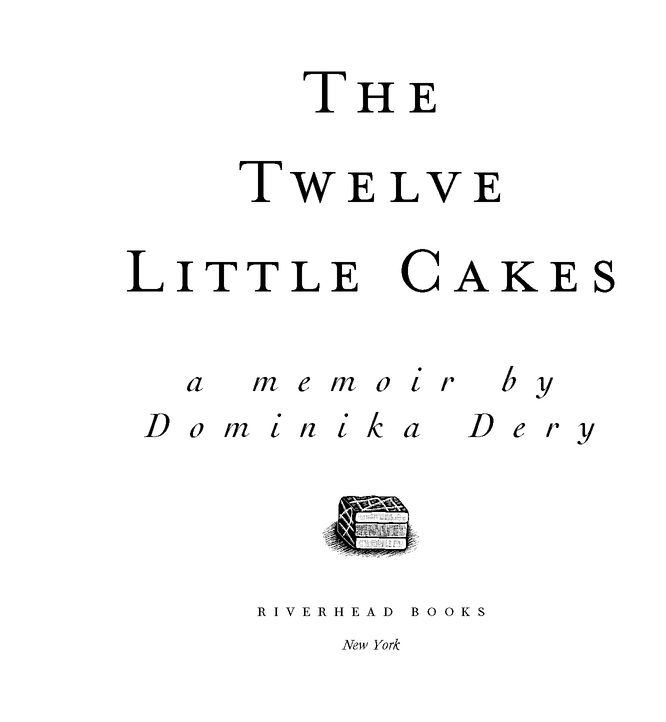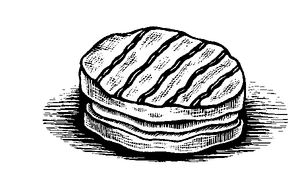The Twelve Little Cakes
Read The Twelve Little Cakes Online
Authors: Dominika Dery

Table of Contents
Â
Â
Praise for Dominika Dery's remembrance of her Prague childhood:
The Twelve Little Cakes
The Twelve Little Cakes
“The public world is rotten with lies and suspicion, but the sweet and feisty child who dances through this memoir is a truthtellerâin Communist Czechoslovakia she's always getting into trouble for it. Perfectly recapturing the detailed perspective of a small person looking up at adults, Dominika Dery shows us how one loved child made magic out of a society hostile to love.”âNuala O'Faolain
Â
“[A] vivid and enchanting account of . . . early childhood in Communist Czechoslovakia. Dery has a real story to tell . . . Here, at last, is a Central-European writer who can be appreciated for her talent, not just her cultural exoticism or dissident politics.
The Twelve Little Cakes
is a time capsule, a faithful account of a lost world. Put aside the narrative, and what you get is a crisp documentary about everyday life in a one-party state. In this wise and disarmingly honest book, she also offers us glimpses of the humor and humanity that flourished in a world where all that people hadâabsent political rights or popular entertainmentâwas âeach other, and plenty of love in our hearts' . . . In Dery's accounting, which rarely veers toward nostalgia, the joy of small things is what life under Communism was all about: the secret rebellion of baking a cake from a recipe handed down from one's aristocratic grandmother; the triumph of making it to the front of the line at the market for live carp at Christmastime; the empowerment that comes from knowing that you have stolen a private moment that no spying neighbor could observe. . . . Dery may not have viewed Communism with adult eyes, but she has managed to say something about it that has eluded legions of historians.”â
Newsday
The Twelve Little Cakes
is a time capsule, a faithful account of a lost world. Put aside the narrative, and what you get is a crisp documentary about everyday life in a one-party state. In this wise and disarmingly honest book, she also offers us glimpses of the humor and humanity that flourished in a world where all that people hadâabsent political rights or popular entertainmentâwas âeach other, and plenty of love in our hearts' . . . In Dery's accounting, which rarely veers toward nostalgia, the joy of small things is what life under Communism was all about: the secret rebellion of baking a cake from a recipe handed down from one's aristocratic grandmother; the triumph of making it to the front of the line at the market for live carp at Christmastime; the empowerment that comes from knowing that you have stolen a private moment that no spying neighbor could observe. . . . Dery may not have viewed Communism with adult eyes, but she has managed to say something about it that has eluded legions of historians.”â
Newsday
“This ramble through a childhood that remained full of pleasure and affection despite the efforts of the Communist regime is well worth taking.”â
The Washington Post
The Washington Post
Â
Â
“True tales of growing up remain one of the most resonant strains of memoir and this recounting of a youth in Czechoslovakia after the failed promise of the âPrague Spring' is another fine example of its resiliency. Dery, a Czech poet, grew up in difficult circumstances as the daughter of two dissidents, but her memoir, written in English, is a testament to the power of irrepressible childhood adventures, even amid a constraining atmosphere of fear and comrades.”
â
Seattle Post-Intelligencer
Seattle Post-Intelligencer
Â
Â
“An unusual slice-of-life view of what it was like growing up in Communist Czechoslovakia in the 1970s. Even though the story is told through the eyes of Dery as a little girl,
The Twelve Little Cakes
gives readers a sophisticated glimpse of a happy, well-adjusted family loving each other and making the best of things while living under constant Communist oppression. [It] has much to say about attitudes. Is it better to forgive or not to forgive? Is it better to be an optimist or a pessimist? Is it worthwhile to stand up for one's convictions even when it is dangerous? These are the themes that run throughout the course of this book, the questions that make this memoir a most unusual and interesting read.Ӊ
Rocky Mountain News
The Twelve Little Cakes
gives readers a sophisticated glimpse of a happy, well-adjusted family loving each other and making the best of things while living under constant Communist oppression. [It] has much to say about attitudes. Is it better to forgive or not to forgive? Is it better to be an optimist or a pessimist? Is it worthwhile to stand up for one's convictions even when it is dangerous? These are the themes that run throughout the course of this book, the questions that make this memoir a most unusual and interesting read.Ӊ
Rocky Mountain News
Â
Â
“An accomplished poet, [Dery] extracts emotional beauty from near squalor.”â
USA Today
USA Today
“In
Ake: The Years of Childhood
(1981), Wole Soyinka exposes the hypocrisies of colonialism in an intimate autobiography of his Nigerian youth. Czech poet and playwright Dery takes a similar approach in this spirited memoir of her childhood, beginning in 1975, on the outskirts of Prague. Demonstrating the ânonsense of the system' from a child's view, Dery recounts the cruelties of the Communist regime: her corrupt, wealthy grandparents disown her dissident parents; Dery's father has difficulty finding work; informers are constant. But Dery portrays her exuberant young self and her devoted parents with enormous affection and a contagious, sly humor as she blends political and cultural observations into stories about universal awakenings: At four years old, she's horrified when her parents kill a live carp for Christmas dinner. And as a preteen, she wonders if cleverness and talent matter less than a ânice pair of goats,' Czech slang for breasts. The result is a warm, intelligent portrait of childhood and a smart, loving family who challenge a system that threatens âno money, no choice, and no chance.'”â
Booklist
Ake: The Years of Childhood
(1981), Wole Soyinka exposes the hypocrisies of colonialism in an intimate autobiography of his Nigerian youth. Czech poet and playwright Dery takes a similar approach in this spirited memoir of her childhood, beginning in 1975, on the outskirts of Prague. Demonstrating the ânonsense of the system' from a child's view, Dery recounts the cruelties of the Communist regime: her corrupt, wealthy grandparents disown her dissident parents; Dery's father has difficulty finding work; informers are constant. But Dery portrays her exuberant young self and her devoted parents with enormous affection and a contagious, sly humor as she blends political and cultural observations into stories about universal awakenings: At four years old, she's horrified when her parents kill a live carp for Christmas dinner. And as a preteen, she wonders if cleverness and talent matter less than a ânice pair of goats,' Czech slang for breasts. The result is a warm, intelligent portrait of childhood and a smart, loving family who challenge a system that threatens âno money, no choice, and no chance.'”â
Booklist
Â
“The world is an adventure for a little girl in this memoir of life in Communist Czechoslovakia. A tale that flows like good fiction.”
â
Fort Worth Star Telegram
Fort Worth Star Telegram
Â
“This is no cynical memoirâit is a touching but clear-eyed testament to a family's will to survive, and even thrive, through the final turbulent years of a terrible regime. . . . Be charmed by Dominika's simple child's love of life and her stubborn insistence on seeing the good.”
â
Library Journal
(Editor's Pick)
Library Journal
(Editor's Pick)
Â
“A disarmingly sweet and savvy memoir . . . Life is hard, and then you laughâif, like this author, you are wily enough, self-possessed enough, and love the ones you're with as they love you back.”
â
Kirkus Reviews
(starred review)
Kirkus Reviews
(starred review)

THE BERKLEY PUBLISHING GROUP
Published by the Penguin Group
Penguin Group (USA) Inc.
375 Hudson Street, New York, New York 10014, USA
Penguin Group (Canada), 90 Eglinton Avenue East, Suite 700, Toronto, Ontario M4P 2Y3, Canada
(a division of Pearson Penguin Canada Inc.)
Penguin Books Ltd., 80 Strand, London WC2R 0RL, England
Penguin Group Ireland, 25 St. Stephen's Green, Dublin 2, Ireland (a division of Penguin Books Ltd.)
Penguin Group (Australia), 250 Camberwell Road, Camberwell, Victoria 3124, Australia
(a division of Pearson Australia Group Pty. Ltd.)
Penguin Books India Pvt. Ltd., 11 Community Centre, Panchsheel Park, New Delhiâ110 017, India
Penguin Group (NZ), cnr Airborne and Rosedale Roads, Albany, Auckland 1310, New Zealand
(a division of Pearson New Zealand Ltd.)
Penguin Books (South Africa) (Pty.) Ltd., 24 Sturdee Avenue, Rosebank, Johannesburg 2196,
South Africa
Published by the Penguin Group
Penguin Group (USA) Inc.
375 Hudson Street, New York, New York 10014, USA
Penguin Group (Canada), 90 Eglinton Avenue East, Suite 700, Toronto, Ontario M4P 2Y3, Canada
(a division of Pearson Penguin Canada Inc.)
Penguin Books Ltd., 80 Strand, London WC2R 0RL, England
Penguin Group Ireland, 25 St. Stephen's Green, Dublin 2, Ireland (a division of Penguin Books Ltd.)
Penguin Group (Australia), 250 Camberwell Road, Camberwell, Victoria 3124, Australia
(a division of Pearson Australia Group Pty. Ltd.)
Penguin Books India Pvt. Ltd., 11 Community Centre, Panchsheel Park, New Delhiâ110 017, India
Penguin Group (NZ), cnr Airborne and Rosedale Roads, Albany, Auckland 1310, New Zealand
(a division of Pearson New Zealand Ltd.)
Penguin Books (South Africa) (Pty.) Ltd., 24 Sturdee Avenue, Rosebank, Johannesburg 2196,
South Africa
Â
Penguin Books Ltd., Registered Offices: 80 Strand, London WC2R 0RL, England
Â
Copyright © 2004 by Dominika DeryÂ
All rights reserved.
No part of this book may be reproduced, scanned, or distributed in any printed or electronic form without
permission. Please do not participate in or encourage piracy of copyrighted materials in violation of
the author's rights. Purchase only authorized editions.
RIVERHEAD is a registered trademark of Penguin Group (USA) Inc.
The RIVERHEAD logo is a trademark of Penguin Group (USA) Inc.
No part of this book may be reproduced, scanned, or distributed in any printed or electronic form without
permission. Please do not participate in or encourage piracy of copyrighted materials in violation of
the author's rights. Purchase only authorized editions.
RIVERHEAD is a registered trademark of Penguin Group (USA) Inc.
The RIVERHEAD logo is a trademark of Penguin Group (USA) Inc.
Â
Â
Â
Dery, Dominika.
The twelve little cakes / by Dominika Dery
p. cm.
The twelve little cakes / by Dominika Dery
p. cm.
eISBN : 978-1-594-48139-0
I. Dery, DominikaâChildhood and youth.
2. Authors, Czechâ20th centuryâBiography. I. Title.
PG5039.14.E78Z
891.8'6354âdc22
2. Authors, Czechâ20th centuryâBiography. I. Title.
PG5039.14.E78Z
891.8'6354âdc22
Â
Â
Â
For my mother, Jana, my father, Jarda, and Barry
ACKNOWLEDGMENTS
I would especially like to thank my agent, Theresa Park, and my editor and publisher in one person, Julie Grau, for their humanity and professionalism. They were my guardian angels, who helped me to overcome the most difficult times of my life. Without them, this book would not have been the same.
one
THE LITTLE DELIGHT

A YEAR BEFORE I WAS BORN, I started turning up in my mother's dreams. She would go to sleep and I would appear before her: a happy little girl in a time of great unhappiness. It was the mid-seventies and Czechoslovakia was at the mercy of the Russians. The borders had been closed, the Soviet Union had taken control of our government, and the hope of the sixties had been crushed by the Cold War. Things were so bad, in fact, that my parents had resolved not to bring another child into the world.
And then I turned up.
My mother remembers the first time she dreamed me. She was standing in the middle of a blossoming garden and a little girl came running through the trees.
“Ahoj!”
the girl exclaimed, which is the informal way of greeting someone in Czech. She took my mother's hand and smiled hopefully.
the girl exclaimed, which is the informal way of greeting someone in Czech. She took my mother's hand and smiled hopefully.
“Will you come with me?” she asked.
“Yes,” my mother replied, and the little girl led her to a swing that hung from the branch of an apple tree.
“Push me!” she cried.
She climbed onto the swing and my mother began to push it. “Higher!” the girl demanded, and my mother pushed her until her feet touched the sky. The sun broke through the morning clouds and my mother's heart was filled with happiness. When she woke up, she could still hear the little girl's laughter. She pressed her body against my father's back and sighed. What a beautiful dream, she thought. And then the alarm clock went off and she had to get up and catch the 7:15 train into Prague.
My mother worked as an analyst at the State Economic Institute. She wrote books that her Communist bosses took credit for, and had to support her family on a meager wage, as my father had difficulty keeping a job. He had worked for the Czech government during the sixties, and was blacklisted by the Russians after the 1968 invasion. An engineer by trade, he would occasionally find work shoveling coal into a furnace, driving a garbage truck, or mixing concrete on a construction site, but the second his political records reached his employers, he would be fired. There was also a real threat that he might be thrown in jail, as it was forbidden to be unemployed under communism, and my mother's biggest fear was a late-night phone call from prison.
The first time the little girl came running through the trees, my mother thought of her own happy childhood. It wasn't until the third or fourth dream that she suddenly understood that the girl was her daughter. Night after night, the girl would appear in the garden and lead my mother to the swing, and she would squeal with delight as the sun broke through the clouds. It had been a long time since my mother had heard such innocent laughter, and she would wake up each morning with a strong feeling that things were going to get better. She hoped until she believed, and then she believed until she knew. She would have another child, and that child would be the little girl from her dream.
Other books
Not Really the Outdoor Type by Paige Tyler
Wyatt by Michelle Horst
Ten Stories About Smoking by Stuart Evers
Cold Kiss by Amy Garvey
Pack Security (Were Chronicles) by Crissy Smith
Windy City Blues by Sara Paretsky
The Duke by Catherine Coulter
Vampire Academy by Richelle Mead
Awe-Struck, Book 2 by Twyla Turner
Been Down So Long It Looks Like Up to Me by Richard Farina